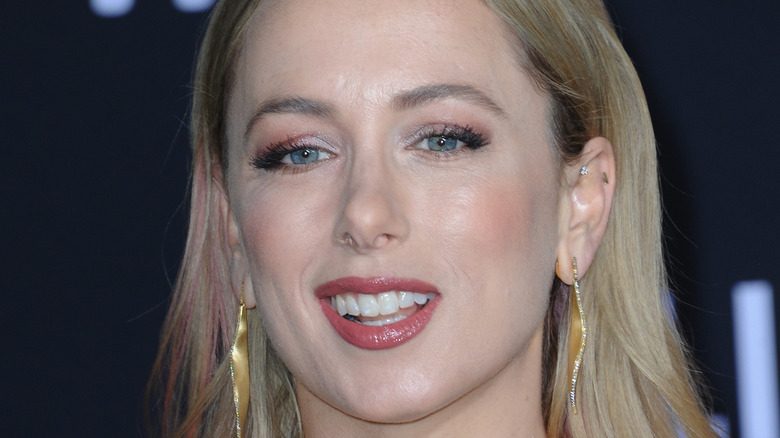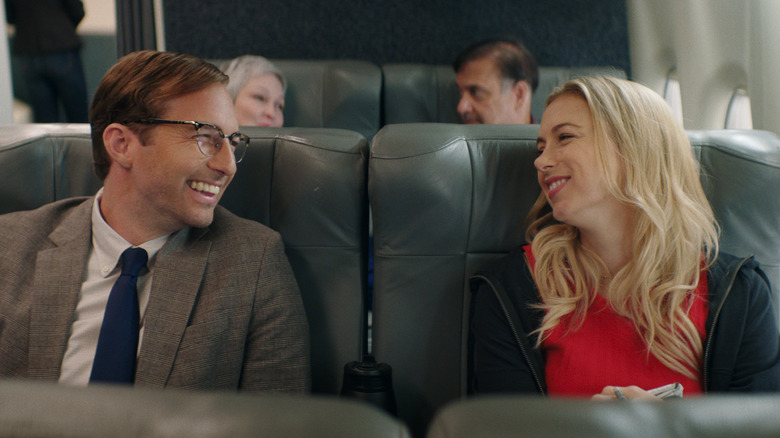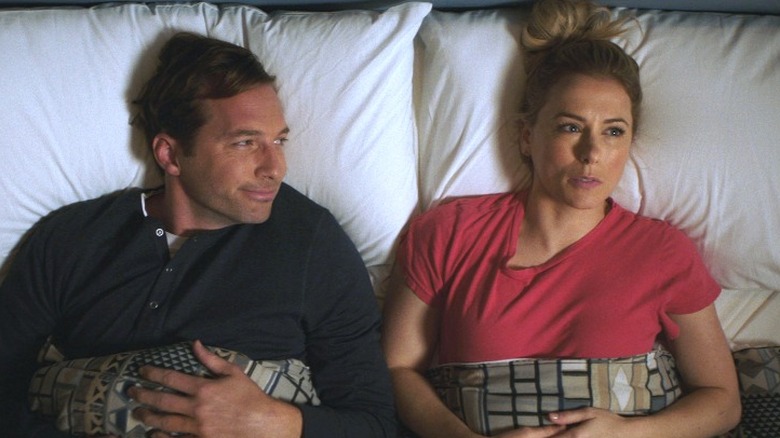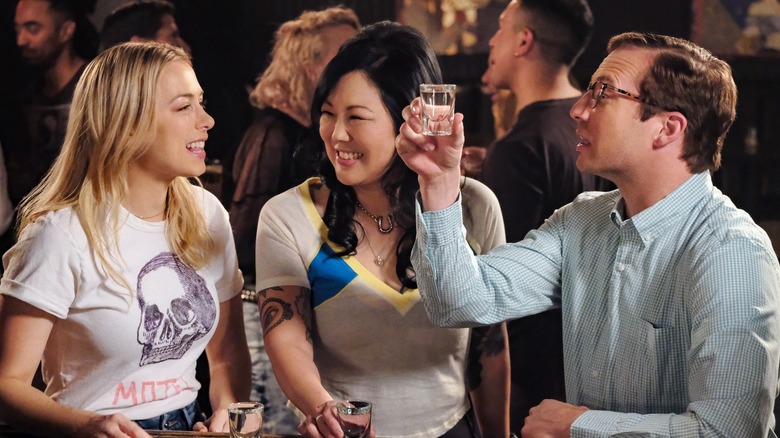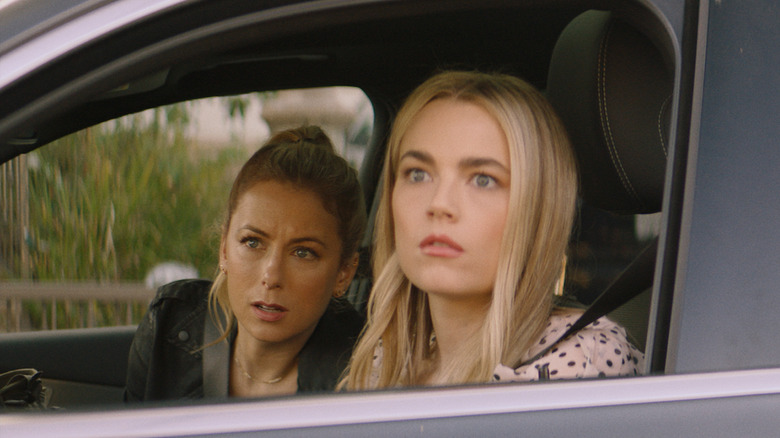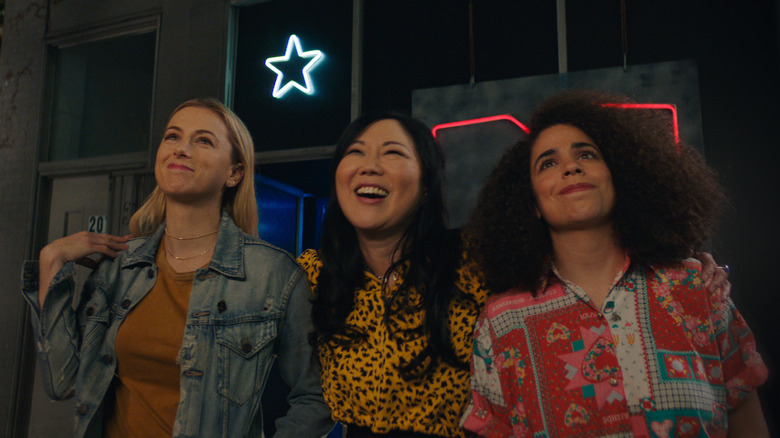Iliza Shlesinger Tackles The Rom-Com Genre With Good On Paper - Exclusive Interview
In the new Netflix movie "Good on Paper," famed stand-up comic and actor Iliza Shlesinger plays Andrea Singer, a popular club act and up-and-coming actor whose life takes a bizarre turn when she meets a somewhat awkward man named Dennis (Ryan Hansen) on a plane. Although initially not attracted to him, Andrea can't help but notice what a good guy Dennis seems to be and become friends with him.
It's only after they eventually become lovers that Andrea begins to notice odd things about Dennis — like the way he doesn't seem to be able to get his story straight about anything, including the most personal details of his life. With her friend, club owner Margot (Margaret Cho), Andrea embarks on a quest to learn the truth about Dennis — a journey that becomes stranger with each new discovery.
Also written by Shlesinger and directed by Kimmy Gatewood, "Good on Paper" is a thinly disguised version of actual events from Shlesinger's own life. "I didn't have to embellish it at all," says Shlesinger in Looper's exclusive interview, although she admits to adding a few plot turns toward the end as a way to get the kind of vindication that she — and so many women in her position — had been denied.
While "Good on Paper" is Shlesinger's first produced full-length screenplay, she is renowned for her work as a stand-up comic and has starred in five comedy specials for Netflix. She's also toplined two limited series, "The Iliza Shlesinger Sketch Show," also for Netflix, and the short-form show "Forever 31" for ABC Digital. Her movie credits include "Pieces of a Woman," "Instant Family" and "Spenser Confidential," the latter two with Mark Wahlberg. And she's pleased to report that she's now happily married, with no permanent damage from the events that inspired "Good on Paper."
Iliza didn't have to embellish a whole lot of Good on Paper
You state right at the top of the film that this is a mostly true story. Where is the line of how much is true and how much isn't?
That's the beauty and the pain of the fact that this very horrific true thing happened — I didn't have to embellish it at all. In fact, sometimes I thought about taking things down because I didn't think people would believe it. I would say two-thirds of it are true. Every single lie that Dennis says in the movie was told to me by this person. Almost every single thing — looking at his house, buying the cups, going to the wrong place, going to the wrong house — that's all very real.
There's still a cathartic effect to watching the things in the movie that aren't true, like the ending.
I put that ending in there really for anybody who's unjustly been screwed over — we're not talking like a relationship ends, but you didn't deserve it, didn't see it coming. I put it in there as vindication. I hope people will watch this rom-com/rom-con and be like, "Yes! That one was for me," at the end.
How writing Good on Paper impacted her
As you wrote this, were you sort of triggering yourself in a way and reliving the responses that you had while you were in the relationship?
The writing was actually incredibly cathartic and I did take a beat to process it. I'm a pretty mentally healthy person, so I found it cathartic to write that, and because I knew this person, it was a great character study. You know, sometimes you write characters and they all end up with your voice. But because I had this person as a direct reference and some of these are lines that he said to me, I just plucked them out of my memory, I was like, this is the only positive part — that I have this brilliant character that we get to bring to life. So it wasn't painful, and in the end it's all art and it's all funny, so it's okay.
How she feels about the real-life ex now
Whatever happened to the real-life Dennis?
I don't know. And I can actually tell you from the bottom of my heart, I'm saying from the highest light, I don't care. I've often thought about like, "Oh, if I saw him in an airport," I think I'd walk the other way, because once you see how sad or small someone is, I don't even care if they ever see the movie because this movie isn't about his reaction. This is about her story, and me as an actor, and providing a funny role for other actors. So what started off as like, "Oh, I'm going to get this guy one day," has turned into a vehicle and so much more, because I chose like a higher path, I think.
What do you think turns people into serial liars of this magnitude?
It's a great question, because when I started telling this story on stage, I found so many people reached out and they were like, "This happened to me" — men and women. Apparently lying about cancer is a big thing that people do. And because the lies were so seemingly small, these weren't like, "I'm the King of France," like these were things that you don't check, which is why they were able to get away with it.
I think it speaks to a rampant insecurity in our culture and from the male side of it. Women have so much pressure, but men buy into what they think they should represent and this has to do with confidence. Because at the end of the day, all the things that Andrea, or myself, liked about this guy were things that you can't fake, like intelligence, wit, sense of humor, kindness. So that's the unfortunate part — that some people are so broken that they won't even give themselves a chance.
How this toxic relationship affected her thoughts on falling in love
How did this change your outlook on love and relationships going forward?
Know what? It's a great question, and the answer is, I made the decision to not let it. I think it's really easy to decide, "Okay, something bad happened, therefore all men are scum." I gave myself time and [with] the guys that I dated subsequently, I was very honest. I'm a very honest person. Look what I do for a living. I would say, "You know, I've been through something really traumatic. I don't think you're a liar, I don't think people are lying, but I'm kind of a little shaky, so if you want to bear with me, great." And people really respond to that openness.
I think going through that and learning to take time for yourself and to be honest about where you are, not just feeling the need to get a boyfriend, made me probably more in touch with myself. I mean, I'd prefer to have not gone through it, because like Andrea I was doing fine before this, I didn't need to be taken down a peg. But I've been married now for three years. He's so supportive. He's confident. I mean, you have to be to watch your wife write a movie about a crazy ex and then do a press tour about it. But he just made me breakfast, so he's the best one.
The weird things Iliza has seen as a stand-up comic
You also touch on some aspects of the stand-up life in the film. Do you have a defining story or incident that encapsulates some of the crazy things that you see as a stand-up?
You know, female safety was never at the top of anyone's priority list when it came to this career, and I think people are more cognizant of it now. I mean, I have had stalkers and continue to have them, and these are not people you know, this is just somebody who wants to do harm because they saw you on a stage or on TV. I've had anti-Semitic things yelled at me from the crowd. I've dumped a drink on someone before. I've had a fight break out.
It's really one of those things where it's a trust act. You're standing on a stage, the audience is dark, and you're hoping we all came with good intentions. But the longer you go on in this career, the more you learn to prepare for those things and to say, "I need security. I need to be walked here." So that's my, I hope, takeaway for young women in comedy — your safety matters, and you're not a diva if you ask for someone to be by your side just to create a barrier. So yeah, there's been a couple of those. Someone licked my ear once at a meet and greet. People get drunk and they forget how to act, or they never knew, but as long as you're okay, then they're all learning tools, I guess.
What do you want to do more of in the future — more feature screenwriting, or perhaps create another TV series?
The answer is "Yes," and I always do those things anyway. Just so few things go in this business. I've written a couple of other screenplays, and I'm attached to some. You always sound like a liar with this, but the answer is, "Yes, I want to do everything as long as I can do it in a creative way, on good terms, and be fulfilled." The answer is, "I want to do everything."
"Good on Paper" premieres Wednesday June 23 on Netflix.
